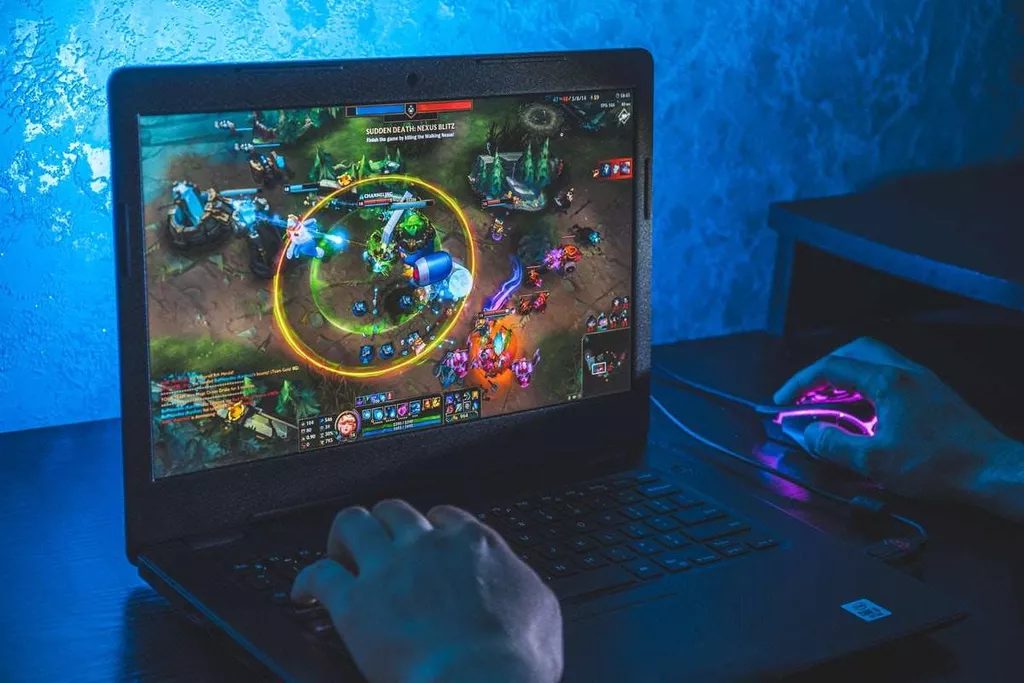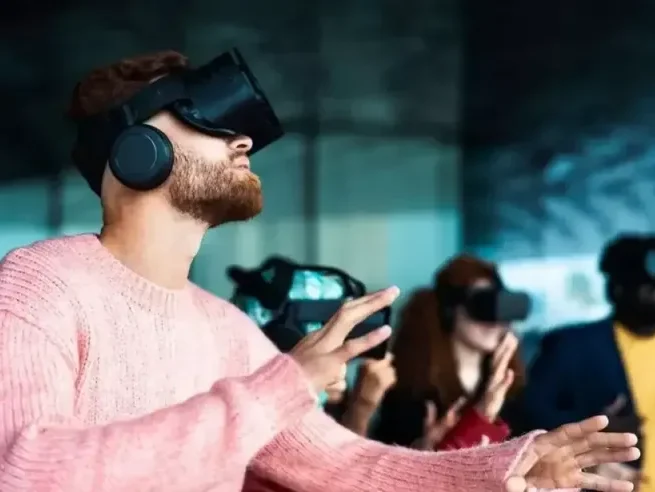If you are fond of playing video games, you probably have dealt with artificial intelligence. Whether you like car racing in Need for Speed, strategy games like Civilization, or shooting games like Counter-Strike, they all contain AI elements. Intelligent technologies are often responsible for managing characters players do not pay much attention to, such as animals, various monsters, traders, and more. Let’s talk about the connection between the gaming area and artificial intelligence.
Some words about AI in gaming
Since the first chess software appeared in the 1950s, video games have become associated with artificial intelligence. Experts tried to develop tools to help computers beat people in various strategic games like chess, poker, and go, contributing to AI’s active development. It led to improvements in the design of new games.
Artificial intelligence is programming that allows non-player characters (NPCs) and enemies to act creatively like a human player controlling them. AI works with the storage of information available to it and uses information bases to create a universe in which heroes exist and perform different actions. All data obtained through AI is processed to create a virtual environment that contains different scenarios, motives, and activities. The game characters themselves are becoming more plausible and acting naturally.
Most often in games, you may find such types of artificial intelligence:
- Deterministic techniques: these are the most common AI tools in the gaming field. The developer specifies deterministic behavior or actions so that they may be easily predicted. These components are easy to implement, understand, test, and customize. The difficulty lies in the fact the creator of the game needs to think through scenarios and code different behaviors. Such methods limit character development and make the amusement predictable.
- Non-deterministic AI methods: when compared to deterministic tools, they have the opposite properties. There are uncertainty components in non-deterministic behavior (depending on the chosen AI technology). An excellent example of such technology is NPCs that analyze players’ tactics and movements and adapt them to fight successfully. Game developers no longer need to think through different scenarios and behaviors. Such methods are capable of self-learning and extrapolation.
Artificial intelligence’s growing popularity in entertainment benefits the entire industry; according to experts, by 2026, its market capitalization will reach $314 billion. As a result, investments in the development of AI-based games worldwide are rapidly increasing.

How does AI change video games?
Modern gaming AI is being used to ensure the perfect player experience. It is critical because developers strive to build games that can be run on different gadgets. The modern game is no longer a choice between a computer and a console. Players want a great experience playing on mobile gadgets such as smartphones, virtual reality headsets, etc. Artificial intelligence provides such console capabilities for any device:
- Creation of original NPCs: in many games, any actions of NPCs are programmed in advance; as a result, the player cannot control them. AI generates a more rational behavior in such heroes, so they instantly fit various game tactics and react to them in a non-standard way. A good solution is to use neural networks with an individual approach to each player. They are committed to maximizing gamer engagement and are happy to take on any gaming challenge.
- Real-life gameplay: AI increases the effectiveness of video game simulations, improves visuals, and allows players to immerse themselves in a fantasy universe. Artificial intelligence predicts the future and easily recreates bizarre virtual worlds with real-time scenes. The use of virtual and augmented reality tools makes the gameplay as exciting and interactive as possible. So, the artificial intelligence scaling option positively affects game graphics and transforms ordinary pictures into realistic photos.
- Tracking cheats: in recent years, various types of cheating have become commonplace in multiplayer games. It negatively affects the gaming experience and leads to severe problems for game creators. Often, gamers are sure that in the multiplayer mode, they will not be able to avoid rivalry with users with fraudulent advantages. The hunt for cheaters in video games has already begun. Many game content firms utilize AI methods to analyze movements and keys to detect cheating.
- Creating unique games: any modern game consists of thousands of three-dimensional images, characters, attributes, sounds, melodies, and other components. The production of such assets requires a lot of money and time. AI may create them in large numbers and in any artistic style. Artificial intelligence techniques create interactive stories based on initial plots and generate coherent text.
- Game testing: entertainment software developers test their games at certain stages to find bugs and problems and to determine all the actions the player may perform. AI automates the testing process. Intelligent tools allow you to analyze thousands of test cases much faster than if employees were doing it. Artificial intelligence looks for dynamic components in video games and finds different details that can be removed from the process. With artificial intelligence, testers may quickly and efficiently do their job.
The formation of AI is associated with using a vast volume of information and creating many different scenarios, actions, and narratives. To date, collating this data requires developers’ time, money, and energy.
Companies operating in the entertainment industry should continue to learn as artificial intelligence advances in products, expanding knowledge and skills. If developers can successfully manage and integrate machine learning into their gaming business, there will be no limits to its use.
The most common AI techniques in the entertainment area
Initially, game industry specialists programmed the behavior of NPCs with rule-based and finite-state machines. Such technologies required programming many conditional expressions for the NPC to get deterministic behavior. To simplify development and bring a touch of unpredictability to the gameplay, developers began to utilize fuzzy logic, which included decision trees, neural systems, genetic algorithms, and reinforcement learning methods. Let’s talk more about these tools:
- Decision trees are supervised learning models capable of making classification and regression. These fundamental machine learning techniques predict how variables change by studying primitive decision rules.
- Deep neutron networks are structures resembling the human brain that learn different options based on training data. When neural networks access a large amount of information, they generate multipurpose real-world scenarios. They quickly adapt to changing gaming environments.
- Genetic mechanisms: These are high-level processes created based on the theory of natural evolution. They solve the optimization problem. The latest variants of genetic algorithms allow NPCs to recognize living players’ effective but repetitive tactics and successfully counter them.
- Reinforcement learning is a machine learning system that relies on trial and mistake. During the study, the model can play out different scenarios and check what they can lead to. It is essential for decision-making in a dynamic environment.
Video game release delays or product presentations with errors are often due to human error. Just a few mistakes in the code are enough for the game engine to stop working correctly, and each error can negatively affect the finished product. Various artificial intelligence methods can reduce the number of mistakes. To search for irregular data, artificial intelligence processes millions of code characters, increasing its efficiency.

Pros and cons of using AI in video games
Recently, video games have become more and more complicated. Designing a project and creating a final product is a complex task, so gaming software companies are exploring the pros and cons of using machine learning, language processing, and neural networks to create entertainment faster and more efficiently in the future. Let’s discuss the main advantages of AI in the amusement sphere:
- Games are getting more intelligent and realistic: with artificial intelligence, NPCs get the opportunity to self-learn from their actions. The gameplay becomes more natural as the system interprets the gamer’s actions and reacts accordingly.
- Save money and time: creating a game is a labor-intensive process. To present an AAA-level game, the development team must work for several years, and after the release, it is necessary to maintain maintenance and product updates. AI is helping the industry by reducing the need to use human resources.
- Simplify gameplay: AI makes games intuitive. Such tools can be used to identify the gamer’s abilities and select the optimal level of difficulty.
Despite all the benefits of adding artificial intelligence in the gaming sphere, there is a downside to this process:
- Strict parameters: did you know that even the best chess players in the world can no longer compete with modern chess AI? Or that Starcraft 2 has software that will quickly destroy any cyber sportsmen? These are just a few words about the intelligence of machines. If programmers do not limit the potential of AI in different directions, competition will disappear because people will not be able to compete with this level of computing.
- Lack of creative processes: Developers are ambivalent about using AI in creativity. On the one hand, he takes over the work related to creating content; on the other hand, these products are completely robotic, and there are no various human tricks.
- System faults: sometimes, the AI will experience glitches beyond its creator’s control. The concern may arise due to unexpected external factors, so developers must consider how to deal with subjective interpretation. It is possible to utilize the capabilities of a machine to make informed decisions, but not having the right amount of operating parameters creates risks.
It is safe to say in the future, the influence of artificial intelligence on the entertainment area will increase. As data becomes more accessible and simplified, even for smaller game content creators, we will likely move towards more advanced visuals and characters that can develop new storylines independently.
Companies have created accounts for AI-based gamers to create a unique gaming atmosphere. Such gamers undergo special training and training in play styles to make all gaming processes as realistic as possible. New artificial intelligence technologies and algorithms appear yearly, allowing developers to demonstrate their potential.
